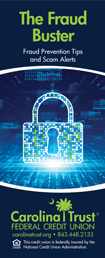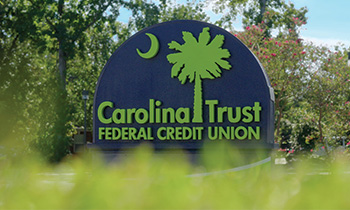Carolina Trust has been made aware of fraudulent calls being received by our members from our toll free number. This number is only for our member to contact us, our members will never receive a call FROM our 888-448-2133 phone number. If you receive a call or text requesting your online banking username and password or any personal information, please do not respond. Never share the text security code, as the text message states, we will NEVER ask for the code. Contact the CU immediately to report the incident.
Remain Alert
Caller ID Spoofing:
It has been reported to us that our local direct dial with an 888 prefix, 888-448-2133, is being spoofed as an incoming call. As a reminder, incoming calls from Carolina Trust will never come from an 888 number. We encourage you to remain vigilant against fraudulent email and phone calls. Carolina Trust representatives will not request your account information through text or over the phone. Please notify us immediately at socialmedia@carolinatrust.org if you believe your account is compromised.
Visit the link below for information on how to protect yourself from caller ID spoofing:
Check Scam Alert:
We have been made aware that counterfeit Carolina Trust FCU official checks are in circulation. Please notify us immediately at socialmedia@carolinatrust.org if you believe you have received a counterfeit check.
Visit the link below for information on how to protect yourself from counterfeit check scams:
Secret Shopper Scams
Visit the link below for information on how to protect yourself from secret shopper and gift card scams:
We encourage you to remain vigilant against fraudulent email and phone calls. Identity thieves are phishing for people’s personal information and playing on vulnerabilities during this time. Stay alert, and never give out your personal or account information by clicking on a link or talking to a caller whose identity you cannot verify. Remember, if we call you about a service request, our Carolina Trust representative will be able to verify your initial online request to us. Carolina Trust representatives will not request your account information through text or over the phone.
Text Message Scams
You’ve probably heard about phishing, where criminals attempt to steal your personal information via email. With the popularity of texting, fraudsters are attempting to dupe victims via text, too. It’s called SMS phishing, or “smishing.”
- Smishing, similar to phishing, is when scammers send a text to trick you into giving away personal information.
- Don’t click any links in text messages that you’re not sure about or respond back to the smishers.
- Contact your bank or credit card company directly to confirm that the text came from a trusted source before sharing any account information.
- Report smishing texts to your mobile provider by texting 7726.
Carolina Trust representatives will never encourage members to buy crypto currency on our social media platforms. Please be aware of any post or review encouraging you to do so.
The most common types of scams will target you through fake emails, text messages, voice calls, letters or even someone who shows up at your front door unexpectedly. No matter which technique the scammer uses, you may be:
- Instructed to not trust Your credit union, or to respond to questions in untruthful ways
- Pressured to send money
- Threatened with law enforcement action
- Told to purchase gift cards and provide codes as a form of payment
- Asked to cash a check for a stranger or send money via wire transfer or another payment app.
- Asked to deposit a check that overpays for something you’re selling, then send the difference elsewhere
Catfishing and Romance Scams
Catfishing is when people create fake profiles online to look like someone else. Usually it happens on dating sites.
In 2017, romance scams cost victims over $200 million. Nearly half of victims were 50 or older. Because older people may be lonely, senior dating scams are very common.
After starting a relationship with someone online, the scammer will start to ask for money, usually small amounts at first (following the foot-in-the-door tactic) for emergencies or to travel to visit the victim. Over time, these requests will get larger until the victim catches on and stops the relationship.
Luckily, there are things you can do to protect yourself from catfishing or romance scams:
- Be wary of people who say they cannot meet, talk on the phone, or use video chat
- Be suspicious of constant emergencies and broken plans
- Never turn over personal photos you would not want widely available
- Don’t give out any money
- Verify information from dating profiles with independent sources
- Watch out for love bombing: excessive displays of affection early in a relationship
- Avoid moving off the dating site too soon: scammers often want to talk over private email or a messaging service
Additional Resources
Visit the links below for additional information on how to protect yourself from scam artists and identity thieves:
Fraud Prevention
This helpful brochure includes fraud prevention tips and common scams and tactics.
Federal Trade Commission
Recognizing these common signs of a scam could help you avoid falling for one.
Scammers use phone calls, email, postal mail, and the internet to trick you into sending money or giving out personal information.
For more information, please visit the Federal Trade Commission website.















